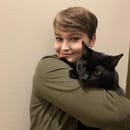Grieving has already been the theme of the past year. Nearly everyone on the planet had to rearrange their lives in one way or another in 2020. We’re grieving the nearly 600,000 American lives lost to Covid-19, and the nearly 3 million worldwide. Many more dealt with the loss of canceled plans- weddings, graduations, reunions, vacations, concerts. And now, those with “long Covid” are mourning the loss of their health, and discovering that it may never return.
I feel terrible for them- because I was there, two years ago, and I’m still grieving, too.
I was diagnosed two years ago with several chronic, debilitating illnesses, a few months before my 20th birthday. At that point, I was spending 4 to 5 days a week bedbound, rarely ever leaving my college apartment. When I did leave, I needed a cane to walk due to the inflammation in my joints.
I’ve spent the time since in rigorous treatment and have tried everything. There’s simply no cure for “post viral syndrome”. Sometimes, after getting infected with a virus, people just don’t ever recover. Or worse, their genetic predispositions can lead to more serious conditions developing. Chronic fatigue, body aches, and orthostatic tachycardia are all some of the symptoms I share with long-covid patients. To date, there is no cure. There is only symptom management.
When I got diagnosed with a severe food allergy, I cried. My mom asked why- it’s just a new diet. I thought of all of the places I wanted to travel to. All of the new places that I wanted to visit, and I’d never be able to try all of their foods. I would be furiously Googling menus of restaurants while all my friends stand around, trying to make a restaurant selection. Soon, they’d learn just not to invite me when they wanted to go eat somewhere.
When the pain became more severe, and I couldn’t dance anymore without breaking out in angry red rashes, I wondered, ‘Will I be able to dance at my own wedding someday?’ I could no longer sing my heart out in the car without hearing my heartbeat in my ears and gasping for breath. When my parents planned our last family vacation pre-Covid, we had to constantly ration my energy, and save certain activities for them to do without me, like hiking or bike riding.
I know what long-Covid patients are feeling. What’s worse, is that I also know what they’re about to encounter- skeptical doctors, nurses, and other healthcare barriers that will delay or prevent treatment altogether. While I began exhibiting severe symptoms at age 13, it would take 7 years (and my parents’ good health insurance) to get answers. That desperation for a reason, for an answer, no matter how terrible it may be, is all the patient desires.
Right now, research is suggesting that 1 in 3 Covid survivors are developing long-term symptoms. That’s a potential ten million new chronically ill Americans due to a novel virus. There’s worldwide attention being put on long-Covid, which is certainly a good thing. However, it’s not the first virus to cause long-term symptoms, and it won’t be the last. Hopefully, the experiences of people like me can help them, too.



